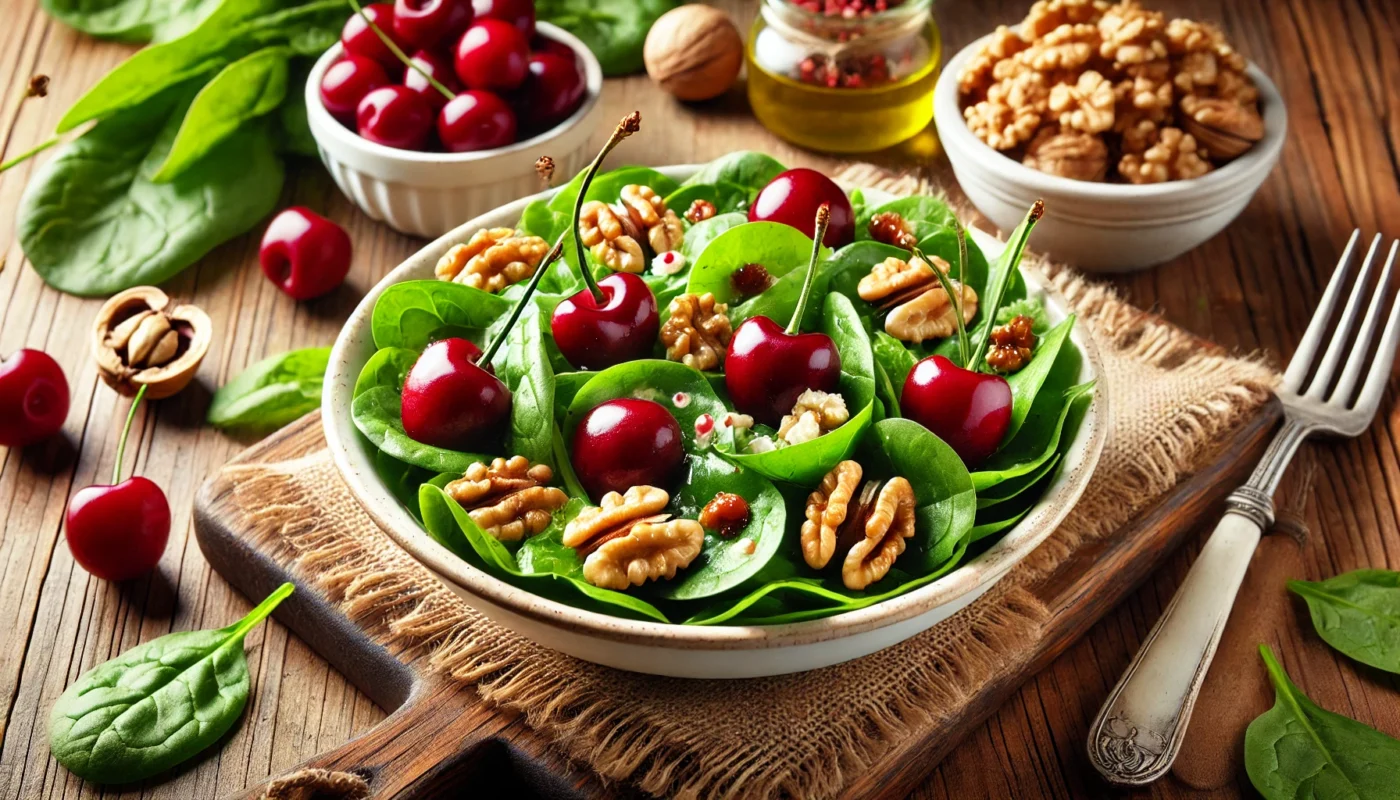Arthritis is a common ailment, causing discomfort and pain in the joints. Traditional treatments often involve medications, physical therapy, and in severe cases, surgery.
However, many individuals seek alternative or complementary approaches. One such approach is the consumption of cherries, particularly tart cherries, for their potential anti-inflammatory effects.
Cherries are rich in antioxidants, such as anthocyanins, which give them their deep red color. These antioxidants have been linked to reducing inflammation, a key factor in arthritis.
Research suggests that tart cherry juice can reduce inflammation markers in the body. Some studies even show improvements in pain and stiffness in osteoarthritis patients who consume tart cherry juice.
But how can you incorporate cherries or cherry juice into your diet effectively? What kind of cherry products should you choose for arthritis relief?
This article aims to answer these questions. We will delve into the science behind cherries’ anti-inflammatory properties and provide practical advice on using cherries for arthritis relief.
Whether you’re a fitness enthusiast, a health enthusiast, or a medical patient, this comprehensive guide will help you understand the potential benefits of cherries for managing arthritis and inflammation. Let’s explore the benefits of cherries for arthritis relief together.
You May Also Like: Do Antioxidants Really Combat Inflammation Effectively?
Understanding Arthritis and Its Traditional Treatments
Arthritis encompasses over 100 different types of joint diseases, with osteoarthritis and rheumatoid arthritis being the most prevalent. This condition commonly results in joint pain, swelling, and decreased mobility, impacting the quality of life for millions worldwide.
The causes of arthritis vary, from wear-and-tear of cartilage to autoimmune conditions. Understanding these underlying mechanisms is crucial for determining effective treatment approaches. Traditional treatments for arthritis often focus on symptom management rather than curing the disease itself.
Medications are typically a first-line treatment option. Nonsteroidal anti-inflammatory drugs (NSAIDs) help reduce pain and swelling, while corticosteroids can control inflammation. However, long-term use of these medications can lead to side effects, such as stomach ulcers and increased risk of infections.
In addition to medications, physical therapy plays a vital role in arthritis management. A well-designed exercise program can strengthen muscles around the joints, improve flexibility, and support joint function. This makes physical therapy a cornerstone of arthritis treatment.
In severe cases, surgical interventions may be required. Procedures like joint replacement or fusion can significantly improve function and reduce pain. However, surgery carries risks and is usually considered after other treatments have been exhausted.
While effective, these traditional methods may not fully address all symptoms or suit everyone’s needs. This limitation drives interest in alternative therapies, like using cherries, to enhance or complement existing treatment regimens. With growing evidence supporting their benefits, cherries hold potential as a natural ally in arthritis management.

The Science Behind Cherries and Inflammation
Cherries, particularly tart cherries, have garnered attention for their potential role in reducing inflammation, a key player in the development of arthritis. This interest primarily stems from their rich composition of bioactive compounds.
These compounds include antioxidants, which scavenge free radicals and reduce oxidative stress, an underlying factor in inflammation. One specific type of antioxidant, anthocyanins, is abundant in cherries and contributes significantly to their therapeutic properties.
Research suggests that anthocyanins, the pigments responsible for the vibrant red color of cherries, have powerful anti-inflammatory effects. By inhibiting enzymes responsible for inducing inflammation, they may help reduce swelling and pain associated with arthritis.
Here’s a list that summarizes the potential mechanisms through which cherries may alleviate inflammation:
- Antioxidant Activity: Neutralizes free radicals.
- Enzyme Inhibition: Suppresses enzymes like COX-1 and COX-2 involved in inflammation.
- Cytokine Regulation: Modulates inflammatory cytokines in the immune system.
In addition to anthocyanins, cherries also contain other health-promoting compounds like quercetin, which may enhance these anti-inflammatory effects. These synergistic interactions further bolster the potential of cherries as a dietary component for managing inflammation.
Ongoing studies continue to explore these mechanisms, striving to better understand how cherries can be harnessed effectively for joint health. Although more research is needed to confirm the full extent of these benefits, the initial findings are promising.
Anthocyanins: The Anti-Inflammatory Powerhouse
Anthocyanins serve as the primary compounds of interest when it comes to cherries’ anti-inflammatory properties. These naturally occurring pigments provide more than just color.
Research indicates that anthocyanins work by blocking inflammatory pathways at the cellular level. They achieve this by inhibiting key enzymes and signaling molecules involved in the inflammatory response.
This inhibition helps reduce the production of inflammatory substances, which can otherwise exacerbate arthritis symptoms. Consequently, foods rich in anthocyanins, such as tart cherries, present a viable option for those seeking natural remedies for inflammation.
Tart Cherry Juice and Biomarkers of Inflammation
Tart cherry juice stands out as a concentrated source of these beneficial anthocyanins, making it an appealing option for arthritis management. Clinical studies have examined its impact on biomarkers of inflammation, with promising results.
One study found that individuals consuming tart cherry juice experienced reduced levels of C-reactive protein (CRP), a marker of inflammation in the body. This reduction suggests a potential decrease in systemic inflammation.
Furthermore, subjects reported decreases in pain and stiffness, indicating improved joint function with regular tart cherry juice consumption. Such findings highlight the juice’s potential as a complementary approach to arthritis treatment.
The effectiveness of tart cherry juice may depend on factors like dosage and frequency. Most studies suggest that consuming the juice twice a day yields the best results. However, it’s important to choose juice that is 100% tart cherry with no added sugars.
These findings underscore the therapeutic potential of tart cherry juice while also emphasizing the need for consistency in consumption to achieve desired benefits. As research evolves, tart cherry juice remains a promising, natural alternative for those managing arthritis.
How to Use Cherries for Arthritis Relief
Incorporating cherries into your diet can be a simple yet effective way to manage arthritis symptoms. Both whole cherries and cherry-derived products offer various options for consumption.
Fresh and frozen cherries serve as a convenient and delicious way to enjoy the fruit’s benefits. Consuming them as snacks or adding them to salads and desserts can seamlessly incorporate them into your daily routine.
Cherry juice, particularly tart cherry juice, is another potent form suitable for individuals seeking relief from arthritis discomfort. It provides a concentrated source of beneficial compounds.
Many people also opt for cherry extract supplements. These can be a practical alternative, particularly for those who may find it challenging to consume large quantities of cherries or juice daily.
Here’s a list of ways to add cherries to your lifestyle:
- Eat Fresh or Frozen: Enjoy as snacks or in desserts.
- Drink Tart Cherry Juice: Choose pure, unsweetened options.
- Use in Cooking: Enhance savory dishes with dried cherries.
- Take Supplements: Follow recommended dosages on labels.
When integrating cherries into your diet, consider other lifestyle adjustments. A balanced diet, regular exercise, and adequate hydration further support joint health. Combining dietary changes with medical advice maximizes benefits for arthritis relief.
Choosing the Right Cherry Products
Selecting the right cherry products is crucial for gaining the most from their arthritis-relieving properties. With numerous options available, knowing what to look for makes a difference.
When purchasing cherry juice, always opt for 100% tart cherry juice without any added sugars. This ensures you receive the purest form of anti-inflammatory compounds without unnecessary additives.
For whole cherries, whether fresh or frozen, prioritizing organic options can be beneficial. Organic cherries are less likely to contain pesticide residues, offering a safer choice.
If considering supplements, check for products that clearly state their concentration of anthocyanins. A higher content likely equates to better anti-inflammatory potential.
Remember that quality matters just as much as quantity. Regular consumption of high-quality cherry products is key to reaping the most substantial health benefits.
Practical Tips for Incorporating Cherries into Your Diet
Integrating cherries into your diet doesn’t have to be difficult. Here are some practical tips and ideas to get you started.
Begin by adding cherries to your breakfast routine. Mix fresh or dried cherries into your morning oatmeal or yogurt for a burst of flavor and nutrients.
For a midday snack, enjoy a handful of frozen cherries or dried cherries combined with nuts. This mix provides a satisfying energy boost and essential micronutrients.
Incorporate tart cherry juice into your beverage choices. Drink a small glass in the morning or after workouts for joint support and recovery.
Consider using cherries in your cooking. Add them to savory dishes like roasted chicken or pork to balance flavors with a hint of natural sweetness.
Here’s a list of meal ideas:
- Breakfast: Oatmeal with fresh cherries.
- Snack: Frozen cherries and nuts mix.
- Beverage: Tart cherry juice with meals.
- Main Dish: Chicken with cherry sauce.
By being creative, you can find numerous ways to incorporate cherries into each meal of the day. Whether through fresh fruit, juice, or recipes, cherries can easily fit into a balanced, arthritis-friendly diet.

The Best Cherry Juice for Arthritis
Finding the best cherry juice for arthritis can make a significant impact on symptom management. Tart cherry juice, known for its dense nutritional profile, is often the most recommended choice for arthritis relief.
The potency of tart cherry juice lies in its high anthocyanin content, which is crucial for reducing inflammation. For optimal benefits, choose a juice sourced from Montmorency cherries, renowned for their anti-inflammatory properties.
Cold-pressed and organic options typically retain more nutrients, offering a purer form of the juice. Minimally processed juices preserve the integrity of beneficial compounds, enhancing their effectiveness against arthritis symptoms.
Regularly consuming high-quality cherry juice can help reduce pain and improve mobility. It’s an accessible and natural addition to a broader arthritis management strategy.
What to Look for in Cherry Juice
When selecting cherry juice for arthritis relief, several factors are important. One key consideration is ensuring the juice is made from 100% tart cherries, without any added sugars or artificial ingredients.
Another aspect to consider is the method of production. Cold-pressed juices are preferable as they maintain more of the fruit’s natural nutrients compared to those made through heat pasteurization.
Check the labels for organic certification, which ensures the cherries are grown without synthetic pesticides. This not only provides health benefits but also supports environmental sustainability.
Choosing the right cherry juice involves scrutinizing product details. The quality of the juice directly influences its potential to alleviate arthritis symptoms. Focusing on purity and production methods helps ensure you receive the maximum health benefits from your purchase.
Potential Side Effects and Considerations
While cherries offer many benefits, it’s important to be aware of potential side effects. Some people may experience gastrointestinal discomfort or diarrhea when consuming large amounts of cherry juice.
Allergic reactions are rare but possible, especially in those with allergies to similar fruits. It’s always wise to introduce cherries gradually into your diet and monitor for any adverse reactions.
Before making significant dietary changes, particularly if you have existing health conditions or are on medication, consulting a healthcare provider is essential. They can provide personalized advice and ensure that incorporating cherries aligns with your health needs.
The Role of Diet in Managing Arthritis
Diet is a foundational component in managing arthritis effectively. Nutrient-rich foods can support joint health and reduce inflammation. A balanced diet, emphasizing whole foods, can complement medical treatments.
Incorporating anti-inflammatory foods, like cherries, can be particularly beneficial. These foods may decrease arthritis symptoms and improve quality of life. Besides cherries, omega-3 rich foods like fish, nuts, and seeds are also recommended.
It’s crucial to avoid processed foods high in sugars and unhealthy fats, as they can exacerbate inflammation. Choosing a diet rich in fruits, vegetables, lean proteins, and whole grains can lead to better symptom management. Tailoring your diet with guidance from a healthcare professional can significantly influence arthritis outcomes.
Personal Stories: Relief from Arthritis Symptoms with Cherries
Many individuals with arthritis have found relief by including cherries in their diet. For instance, Sarah, a retired teacher, struggled with knee pain due to osteoarthritis. After she began drinking tart cherry juice daily, she noticed a significant reduction in her joint discomfort over several weeks.
Similarly, John, a fitness enthusiast, incorporated cherries into his breakfast routine. He reported that his post-exercise soreness decreased, allowing him to maintain a more consistent workout schedule. His experience highlights the potential role of cherries in managing exercise-induced inflammation as well.
These personal accounts underline the potential of cherries as a natural remedy. While not a cure, cherries can be a valuable component of an arthritis management plan. Engaging with healthcare professionals can help tailor dietary approaches to suit individual needs, maximizing the benefits of cherries for arthritis relief.
The Future of Cherries in Arthritis Research
Research into cherries and their impact on arthritis is ongoing, with promising potential. Scientists are focusing on understanding how cherries influence inflammatory pathways at a molecular level. This could lead to more targeted and effective treatments in the future.
Emerging studies are also exploring the long-term effects of regular cherry consumption on arthritis progression. As researchers uncover more about cherries’ role in reducing inflammation, their findings could pave the way for new dietary guidelines and complementary therapies. This ongoing research underscores the exciting possibilities of integrating cherries into holistic arthritis management strategies.

Conclusion: Embracing Cherries for Holistic Arthritis Management
Cherries offer more than a delightful taste; they contribute to arthritis relief through their potent anti-inflammatory properties. Understanding how cherries, especially tart varieties, can help manage joint pain is an empowering tool for those with arthritis.
Incorporating cherries into a well-balanced diet complements traditional arthritis treatments, offering a natural approach to managing symptoms. This holistic method emphasizes the benefits of dietary changes alongside medical advice.
For anyone seeking to improve their quality of life with arthritis, cherries provide an accessible and beneficial option. By integrating cherries into daily meals, individuals can take a proactive step toward enhanced well-being and joint health.
Further Reading:
Verywell Health: Health Benefits of Cherry Juice
Everyday Health: 6 Best Fruits for Psoriatic Arthritis
National Library of Medicine: Randomized double-blind crossover study of the efficacy of a tart cherry juice blend in treatment of osteoarthritis (OA) of the knee
Cherries, Arthritis, Tart Cherry Juice, Anti-Inflammatory Foods, Joint Health, Nutritional Benefits, Dietary Management, Health Tips, Natural Remedies, Holistic Health, Organic Juice, Inflammation Reduction, Personal Stories, Health Research, Wellness
Important Note: The information contained in this article is for general informational purposes only, and should not be construed as health or medical advice, nor is it intended to diagnose, prevent, treat, or cure any disease or health condition. Before embarking on any diet, fitness regimen, or program of nutritional supplementation, it is advisable to consult your healthcare professional in order to determine its safety and probable efficacy in terms of your individual state of health.
Regarding Nutritional Supplements Or Other Non-Prescription Health Products: If any nutritional supplements or other non-prescription health products are mentioned in the foregoing article, any claims or statements made about them have not been evaluated by the U.S. Food and Drug Administration, and such nutritional supplements or other health products are not intended to diagnose, treat, cure, or prevent any disease.

